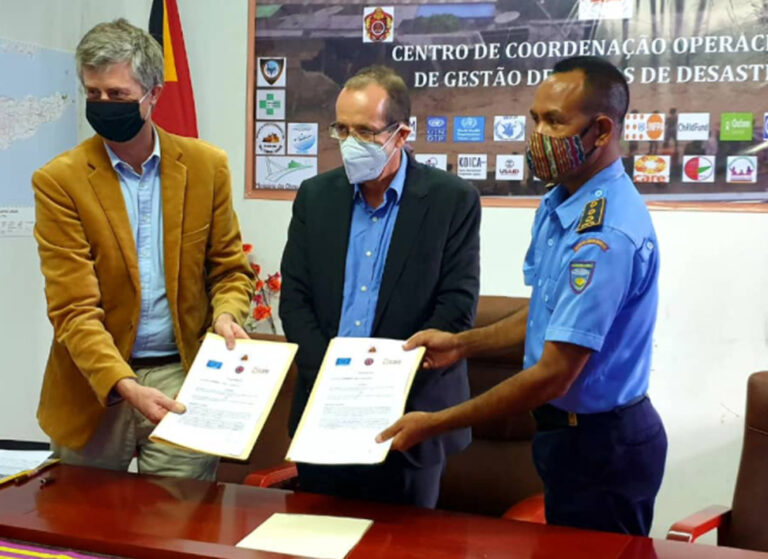EU-CARE support €100,000 to recover families from flood impacts

CARE International in Timor-Leste (CARE) would support the Government of Timor-Leste to provide housing to families affected by the April floods in Timor-Leste through €100,000 financial support for shelter technical assistance from the European Union (EU).
This technical shelter support included awareness-raising of how to construct safe housing, ensuring the inclusion of women, girls, and people living with a disability. This ensured that everyone who needed shelter would be heard in the decision-making process, and would focus on identifying and increasing their meaningful participation in humanitarian decision-making for the future.
Peter Goodfellow, Country Director of CARE International in Timor-Leste said CARE was committed to supporting the Secretariat of Civil Protection (SEPS) to ensure that vulnerable families affected by the flooding were able to return home safely.
He said therefore CARE was currently supporting families who have been impacted by the April floods by working alongside the Government of Timor-Leste to provide technical shelter support to at least 200 households in Dili.
“Many families remain at risk of future flooding and landslides and we are proud to work with the European Union to reduce such households’ vulnerability to future disasters through improved house construction techniques for resilient housing,” Goodfellow made the comments during a press conference, in Dili, today.
He said women and children were 14 times more likely than men to die in an emergency and its aftermath in the Asia-Pacific region: “CARE’s focus on bringing women into humanitarian planning actively reduces this gap.”
CARE would use the Lafaek magazine to reach 103,000 households in rural and remote areas, and CARE’s Lafaek Facebook page to reach over 137,000 people in urban areas. In total, CARE will reach hundreds of thousands of people with information about safe house construction, Goodfellow said.
At the same place, the Ambassador of the European Union to Timor-Leste, Andrew Jacobs, recognized that climate change was exacerbating environmental degradation and said, “In addition to increasingly frequent and severe natural hazards triggering disaster, climate change, and environmental degradation were among the root causes of conflict, food insecurity, and displacement.
“It’s a good initiative to introduce activities such as flood awareness and risk communication awareness-raising to community members in 13 municipalities through CARE’s long-standing Lafaek educational magazine as designed in this program”.
The April floods were the biggest in 50 years. A surge in Covid-19 cases and the attempts to slow the spread have pushed already vulnerable people in Dili, and across Timor-Leste, into even more precarious positions as they try to find work, maintain hygiene, and distancing practices.
Search
Lates News
- Australian Humanitarian Partnership’s Disaster READY implements initiative to increase resilience of vulnerable communities to climate shocks
- CARE collaborates with faith leader to encourage men and boys to challenge gender inequality
- Savings group initiatives empower women to lead change
- CARE Embarks on Equitable Partnership Journey with Local Civil Society Organisations to Advance Women’s Economic Justice in Timor-Leste
- The Government of Japan and CARE continues to strengthen agricultural production and women’s economic empowerment in Atsabe
Archive
Category
Clendar
| M | T | W | T | F | S | S |
|---|---|---|---|---|---|---|
| 1 | ||||||
| 2 | 3 | 4 | 5 | 6 | 7 | 8 |
| 9 | 10 | 11 | 12 | 13 | 14 | 15 |
| 16 | 17 | 18 | 19 | 20 | 21 | 22 |
| 23 | 24 | 25 | 26 | 27 | 28 | 29 |
| 30 | 31 | |||||
